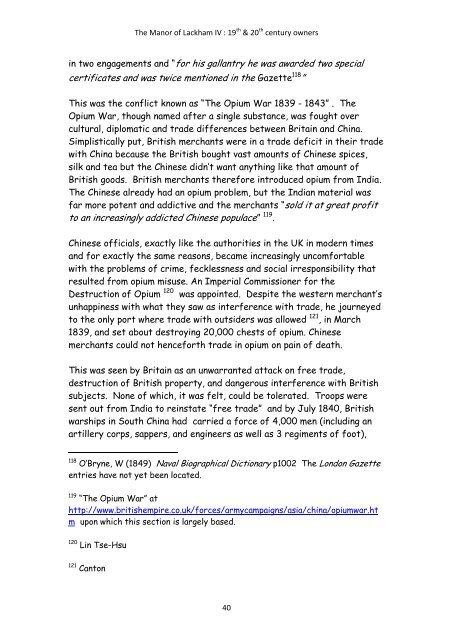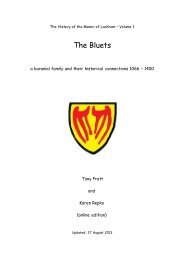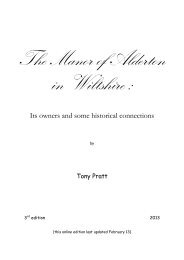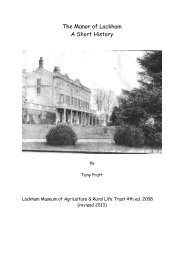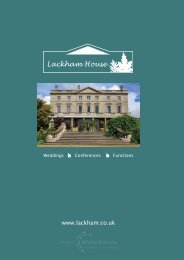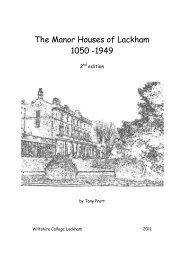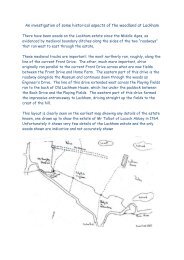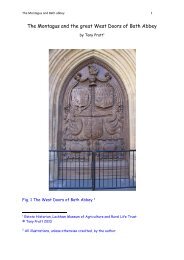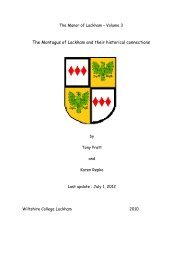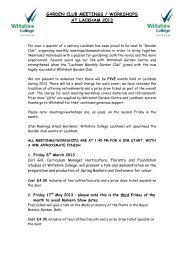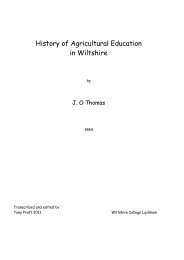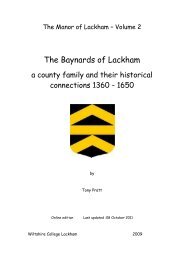The owners of Lackham in the Nineteenth and Twentieth centuries ...
The owners of Lackham in the Nineteenth and Twentieth centuries ...
The owners of Lackham in the Nineteenth and Twentieth centuries ...
You also want an ePaper? Increase the reach of your titles
YUMPU automatically turns print PDFs into web optimized ePapers that Google loves.
<strong>The</strong> Manor <strong>of</strong> <strong>Lackham</strong> IV : 19 th & 20 th century <strong>owners</strong><br />
<strong>in</strong> two engagements <strong>and</strong> “for his gallantry he was awarded two special<br />
certificates <strong>and</strong> was twice mentioned <strong>in</strong> <strong>the</strong> Gazette 118 ”<br />
This was <strong>the</strong> conflict known as “<strong>The</strong> Opium War 1839 - 1843” . <strong>The</strong><br />
Opium War, though named after a s<strong>in</strong>gle substance, was fought over<br />
cultural, diplomatic <strong>and</strong> trade differences between Brita<strong>in</strong> <strong>and</strong> Ch<strong>in</strong>a.<br />
Simplistically put, British merchants were <strong>in</strong> a trade deficit <strong>in</strong> <strong>the</strong>ir trade<br />
with Ch<strong>in</strong>a because <strong>the</strong> British bought vast amounts <strong>of</strong> Ch<strong>in</strong>ese spices,<br />
silk <strong>and</strong> tea but <strong>the</strong> Ch<strong>in</strong>ese didn’t want anyth<strong>in</strong>g like that amount <strong>of</strong><br />
British goods. British merchants <strong>the</strong>refore <strong>in</strong>troduced opium from India.<br />
<strong>The</strong> Ch<strong>in</strong>ese already had an opium problem, but <strong>the</strong> Indian material was<br />
far more potent <strong>and</strong> addictive <strong>and</strong> <strong>the</strong> merchants “sold it at great pr<strong>of</strong>it<br />
to an <strong>in</strong>creas<strong>in</strong>gly addicted Ch<strong>in</strong>ese populace” 119 .<br />
Ch<strong>in</strong>ese <strong>of</strong>ficials, exactly like <strong>the</strong> authorities <strong>in</strong> <strong>the</strong> UK <strong>in</strong> modern times<br />
<strong>and</strong> for exactly <strong>the</strong> same reasons, became <strong>in</strong>creas<strong>in</strong>gly uncomfortable<br />
with <strong>the</strong> problems <strong>of</strong> crime, fecklessness <strong>and</strong> social irresponsibility that<br />
resulted from opium misuse. An Imperial Commissioner for <strong>the</strong><br />
Destruction <strong>of</strong> Opium 120 was appo<strong>in</strong>ted. Despite <strong>the</strong> western merchant’s<br />
unhapp<strong>in</strong>ess with what <strong>the</strong>y saw as <strong>in</strong>terference with trade, he journeyed<br />
to <strong>the</strong> only port where trade with outsiders was allowed 121 , <strong>in</strong> March<br />
1839, <strong>and</strong> set about destroy<strong>in</strong>g 20,000 chests <strong>of</strong> opium. Ch<strong>in</strong>ese<br />
merchants could not henceforth trade <strong>in</strong> opium on pa<strong>in</strong> <strong>of</strong> death.<br />
This was seen by Brita<strong>in</strong> as an unwarranted attack on free trade,<br />
destruction <strong>of</strong> British property, <strong>and</strong> dangerous <strong>in</strong>terference with British<br />
subjects. None <strong>of</strong> which, it was felt, could be tolerated. Troops were<br />
sent out from India to re<strong>in</strong>state “free trade” <strong>and</strong> by July 1840, British<br />
warships <strong>in</strong> South Ch<strong>in</strong>a had carried a force <strong>of</strong> 4,000 men (<strong>in</strong>clud<strong>in</strong>g an<br />
artillery corps, sappers, <strong>and</strong> eng<strong>in</strong>eers as well as 3 regiments <strong>of</strong> foot),<br />
118 O’Bryne, W (1849) Naval Biographical Dictionary p1002 <strong>The</strong> London Gazette<br />
entries have not yet been located.<br />
119 “<strong>The</strong> Opium War” at<br />
http://www.britishempire.co.uk/forces/armycampaigns/asia/ch<strong>in</strong>a/opiumwar.ht<br />
m upon which this section is largely based.<br />
120 L<strong>in</strong> Tse-Hsu<br />
121 Canton<br />
40


